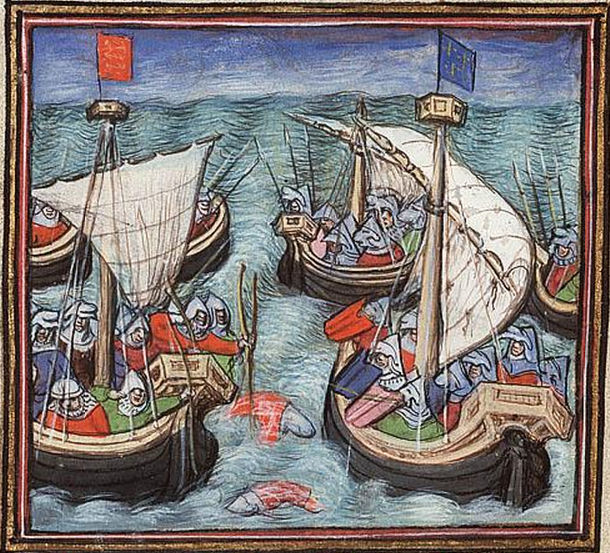*Image Credit: Wikimedia Commons The bitter feud over territory between the English and French that would become the Hundred Years’ War had only just escalated to violence on September 21, 1338. As the two navies engaged in hostilities for the first time in the conflict, the English ship Christofer brought a weapon to bear that had never been used at sea: the cannon. As ships from both sides maneuvered through the choppy seas of the English Channel near Arnemuiden, three cannons and a hand gun altered the way naval warfare would be conducted for the rest of time. Just the year before, a long-simmering argument over the rights of France to territory in Normandy boiled over. In the 250-plus years since the Norman invasion of Britain in 1066, the French had conquered and subjected the English nobility, then been pushed back across the Channel and forced to cede large tracts of land before regaining much of the lost provinces by the mid-1320s. Before long, wealthy landowners in England were clamoring for a return to lands their grandparents and great-grandparents had owned on the continent. At the same time, the French royal family was in shambles. After the death of King Charles IV in 1328, there was no rightful heir to the crown other than the King of England, Edward III. Through deft political maneuvering — and because the nobility in France refused to hail an English king — Philip VI of France was crowned in 1328. Less than a decade later, French ships were sailing across the Channel in search of good places to land troops. The early skirmishes led Philip to inform Edward he had reclaimed Gascony for the French crown and that Edward, as holder of those lands, owed him tribute for lordship. In reply, Edward asserted his rightful claim to the throne of France. The answer meant war. The morning of September 23, 1338 seemed like any other for five large English carracks transporting wool to the Count of Flanders in the Kingdom of France. Nearing the port of Arnemuiden, an island controlled by Edward’s ally, the French navy under Hugues Quieret and Nicolas Behuchet swept in with far more ships as the English unloaded the cargo. Easy targets for capture while moored at the docks, the Christofer and its sister ships quickly moved out to sea, leaving some of the crew behind. John Kingston, commander of the five-ship group, had a weapon at his disposal that could help: cannons. Up until that point in history, the most significant threat to a ship at sea had been fire. For hundreds of years, navies all over the world had attempted to float small boats set ablaze near enough to enemy vessels in the hopes the flames would ignite the timbers. When that didn’t work, admirals directed their sailors to attempt a ram the sides of opposing boats to inflict damage. The Christofer, armed with cannonballs, could now put holes in the side of another ship from a hundred meters or more. Thoroughly outnumbered, Kingston was unable to truly capitalize on the advantage produced. After a long day of fighting and several attempts to find a way to make a run for it, the English were forced to surrender. The French, claiming the five ships as their own, put the crew to death — among the first casualties in a war that would last until 1453, well over a hundred years. Also On This Day: 1776 – Part of New York City is burned after British troops occupy it. 1792 – The National Convention abolishes the French monarchy and establishes a new republic. 1937 – The Hobbit by J.R.R. Tolkein is published for the first time. 1942 – The B-29 Superfortress, which later dropped atomic bombs on Hiroshima and Nagasaki, makes its first flight on the same day thousands of Jews are herded into ghettos and extermination camps by the Nazis on Yom Kippur. 1993 – Russian President Boris Yeltsin suspends parliament and incites the Constitutional Crisis of 1993.
September 21, 1338 CE – Artillery is Used in a Naval Engagement During the Battle of Arnemuiden in the Hundred Years’ War
*Image Credit: Wikimedia Commons The bitter feud over territory between the English and French that would become the Hundred Years’ War had only just escalated to violence on September 21,…
436
